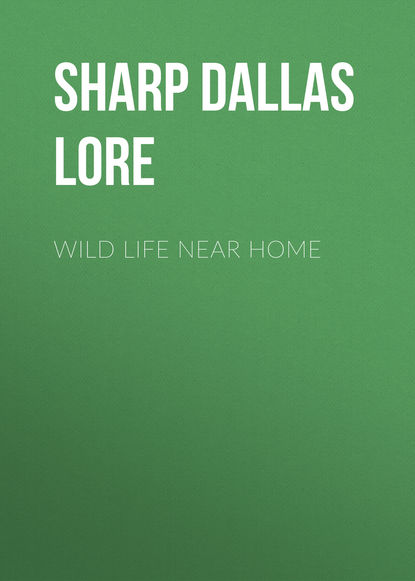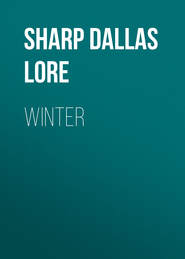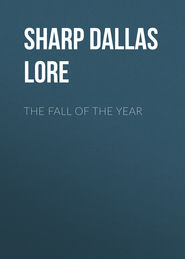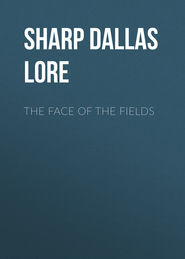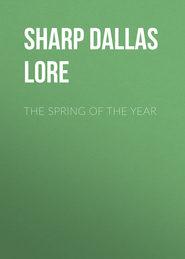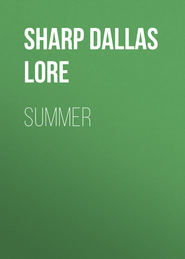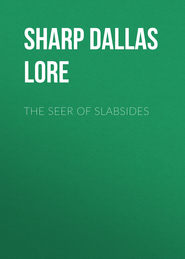По всем вопросам обращайтесь на: info@litportal.ru
(©) 2003-2024.
✖
Wild Life Near Home
Настройки чтения
Размер шрифта
Высота строк
Поля
I held up a bunch of freshly washed grass-roots.
"Uncle Jeth, this must be a new species of possum; he eats roots like any muskrat," I said innocently.
It was good for Calamity not to be there just then. Uncle Jethro loved her as he would have loved a child; but he vowed, as he picked up his gun: "De nex' time dat no-'count dog don't talk possum, yo' 'll see de buzzard 'bout, yo' will."
We tramped up the hill and on through the woods to some open fields. Here on the fence we waited for Calamity's signal.
"Did you say you wouldn't put any price on Calamity, Uncle Jethro?" I asked as we waited.
There was no reply.
"Going to roast this possum, aren't you?"
Silence.
"Am I going to have an invite, Uncle Jeth?"
"Hush up, boy! How we gwine yhear w'at dat dog say?"
"Calamity? Why, didn't you tell her to go home?"
The woods were still. A little screech-owl off in the trees was the only creature that disturbed the brittle silence. The owl was flitting from perch to perch, coming nearer us.
"W'at dat owl say?" whispered Uncle Jethro, starting. "'No possum'? 'no possum'? 'no possum'? Come 'long home, boy," he commanded aloud. "W'en ol' Miss Owl say 'No possum,' C'lamity herself ain't gwine git none." And sliding to the ground, he trudged off for home.
We were back again in the corn-field with an empty sack. The moon was riding high near eleven o'clock. From behind a shock Calamity joined us, falling in at the rear like one of our shadows. Of course Uncle Jethro did not see her. He was proud of the rheumatic old hound, and a night like this nipped his pride as the first frosts nip the lima-beans.
It was the owl's evil doing, he argued all the way home. "W'en ol' Miss Owl say 'Stay in' – no use:
'Simmons sweet, 'simmons red,
Ain't no possum leave his bed.
All de dogs in Mount Zion won't fin' no possum out dis night."
No; it was not Calamity's fault: it was Miss Owl's.
We were turning in back of the barn when there came a sudden yelp, sharp as a pistol-shot, and Calamity darted through Uncle Jethro's legs, almost upsetting him, making straight for the yard. At the same moment I caught sight of a large creature hurrying with a wabbly, uncertain gait along the ridge-pole of the hen-house.
It was a possum – as big as a coon. He was already half-way down the side of the coop; but Calamity was below him, howling like mad.
Uncle Jethro nearly unjointed himself. Before the frightened animal had time to faint, the triumphant hunter was jouncing him up and down inside the sack, and promising the bones and baking-pan to Calamity.
"W'at dat yo' mumblin', boy? Gwine ax yo'self a' invite? G' 'way; g' 'way; yo' don' lak possum. W'at dat yo' sayin' 'g'in' C'lamity? Yo' 's needin' sleep, chil', yo' is. Ain't I done tol' yo' dat dog gwine talk possum by-um-bit? W'at dem 'flections 'g'in' ol' Miss Owl? Boosh, boy! Dat all fool-talk, w'at ol' Miss Owl say. We done been layin' low jis s'prise yo', me an' C'lamity an' ol' Miss Owl has." And as he placed the chopping-block upon the barrel to keep the possum safe till morning, he began again:
"Coon he up a gum-tree,
Possum in de holla;
Coon he roll hi'self in ha'r,
Possum roll in talla.
"Lawd, I wunda, who kilt John Henry,
In de la-ane, in de lane."
The next morning Uncle Jethro went to get his possum. But the possum was gone. The chopping-block lay on the woodshed floor, the cover of the barrel was pushed aside, and the only trace of the animal was a bundle of seed-corn that he had pulled from a nail overhead and left half eaten on the floor. He had stopped for a meal on his way out.
Uncle Jethro, with Uncle Remus, gives Br'er Rabbit the wreath for craft; but in truth the laurel belongs to Br'er Possum. He is an eternal surprise. Either he is the most stupidly wise animal of the woods, or the most wisely stupid. He is a puzzle. Apparently his one unburied talent is heaviness. Joe, the fat boy, was not a sounder nor more constant sleeper, nor was his mental machinery any slower than the possum's. The little beast is utterly wanting in swiftness and weapons, his sole hope and defense being luck and indifference. To luck and indifference he trusts life and happiness. And who can say he does not prosper – that he does not roll in fat?
I suppose there once were deer and otter in the stretches of wild woodland along the Cohansey; but a fox is rare here now, and the coon by no means abundant. Indeed, the rabbit, even with the help of the game laws, has a hard time. Yet the possum, unprotected by law, slow of foot, slower of thought, and worth fifty cents in any market, still flourishes along the creek.
A greyhound must push to overtake a rabbit, but I have run down a possum with my winter boots on in less than half-way across a clean ten-acre field. He ambles along like a bear, swinging his head from side to side to see how fast you are gaining upon him. When you come up and touch him with your foot, over he goes, grunting and grinning with his mouth wide open. If you nudge him further, or bark, he will die – but he will come to life again when you turn your back.
Some scientifically minded people believe that this "playing possum" follows as a physiological effect of fear; that is, they say the pulse slackens, the temperature falls, and, as a result, instead of a pretense of being dead, the poor possum actually swoons.
A physiologist in his laboratory, with stethoscope, sphygmoscope, thermometer, and pneumonometer, may be able to scare a possum into a fit – I should say he might; but I doubt if a plain naturalist in the woods, with only his two eyes, a jack-knife, and a bit of string, was ever able to make the possum do more than "play possum."
We will try to believe with the laboratory investigator that the possum does genuinely faint. However, it will not be rank heresy to run over this leaf from my diary. It records a faithful diagnosis of the case as I observed it. The statement does not claim to be scientific; I mean that there were no 'meters or 'scopes of any kind used. It is simply what I saw and have seen a hundred times. Here is the entry:
I have known the possum too long for a ready faith in his extreme nervousness, too long to believe him so hysterical that the least surprise can frighten him into fits. He has a reasonable fear of dogs; no fear at all of cats; and will take his chances any night with a coon for the possession of a hollow log. He will live in the same burrow with other possums, with owls, – with anything in fact, – and overlook any bearable imposition; he will run away from everything, venture anywhere, and manage to escape from the most impossible situations. Is this an epileptic, an unstrung, flighty creature? Possibly; but look at him. He rolls in fat; and how long has obesity been the peculiar accompaniment of nervousness?
It is the amazing coolness of the possum, however, that most completely disposes of the scientist's pathetic tale of unsteady nerves. A creature that will deliberately walk into a trap, spring it, eat the bait, then calmly lie down and sleep until the trapper comes, has no nerves. I used to catch a possum, now and then, in the box-traps set for rabbits. It is a delicate task to take a rabbit from such a trap; for, give him a crack of chance and away he bolts to freedom. Open the lid carefully when there is a possum inside, and you will find the old fellow curled up with a sweet smile of peace on his face, fast asleep. Shake the trap, and he rouses yawningly, with a mildly injured air, offended at your rudeness, and wanting to know why you should wake an innocent possum from so safe and comfortable a bed. He blinks at you inquiringly and says: "Please, sir, if you will be so kind as to shut the door and go away, I will finish my nap." And while he is saying it, before your very eyes, off to sleep he goes.
Is this nervousness? What, then, is it – stupidity or insolence?
Physically as well as psychologically the possums are out of the ordinary. As every one knows, they are marsupials; that is, they have a pouch or pocket on the abdomen in which they carry the young. Into this pocket the young are transferred as soon as they are born, and were it not for this strange half-way house along the journey of their development they would perish.
At birth a possum is little more than formed – the least mature babe among all of our mammals. It is only half an inch long, blind, deaf, naked, and so weak and helpless as to be unable to open its mouth or even cry. Such babies are rare. The smallest young mice you ever saw are as large as possums at their birth. They weigh only about four grains, the largest of them, and are so very tiny that the mother has to fasten each to a teat and force the milk down each wee throat – for they cannot even swallow.
They live in this cradle for about five weeks, by which time they can creep out and climb over their mother. They are then about the size of full-grown mice, and the dearest of wood babies. They have sharp pink noses, snapping black eyes, gray fur, and the longest, barest tails. I think that the most interesting picture I ever saw in the woods was an old mother possum with eleven little ones clinging to her. She was standing off a dog as I came up, and every one of the eleven was peeking out, immensely enjoying this first adventure. The quizzing snouts of six were poked out in a bunch from the cradle-pouch, while the other five mites were upon their mother's back, where they had been playing Jack-and-the-beanstalk up and down her tail.
Historically, also, the possum is a conundrum. He has not a single relative on this continent, except those on exhibition in zoölogical gardens. He left kith and kin behind in Australia when he came over to our country. How he got here, and when, we do not know. Clouds hang heavy over the voyages of all the discoverers of America. The possum was one of the first to find us, and when did he land, I wonder? How long before Columbus, and Leif, son of Eric?
In his appetite the possum is no way peculiar, except, perhaps, that he takes the seasons' menus entire. Between persimmon-times he eats all sorts of animal food, and is a much better hunter than we usually give him credit for. Considering his slowness, too, he manages to plod over an amazing amount of territory in the course of his evening rambles. He starts out at dusk, and wanders around all night, planning his hunt so as to get back to his lair by dawn. Sometimes at daybreak he is a long way from home. Not being able to see well in the light, and rather than run into needless danger, he then crawls into the nearest hole or under the first rail-pile he comes to; or else he climbs a tree, and, wrapping his tail about a limb, settles himself comfortably in a forked branch quite out of sight, and sleeps till darkness comes again.
On these expeditions he picks up frogs, fish, eggs, birds, mice, corn, and in winter a chicken here and there.
In the edge of a piece of woods along the Cohansey there used to stand a large hen-coop surrounded by a ten-foot fence of wire netting. One winter several chickens were missing here, and though rats and other prowlers about the pen were caught, still the chickens continued to disappear.
One morning a possum was seen to descend the wire fence and enter the coop through the small square door used by the fowls. We ran in; but there was no possum to be found. We thought we had searched everywhere until, finally, one of us lifted the lids off a rusty old stove that had been used to heat the coop the winter before, and there was the possum, with two companions, snug and warm, in a nest of feathers on the grate.
Here were the remains of the lost chickens. These sly thieves had camped in this stove ever since autumn, crawling in and out through the stovepipe hole. During the day they slept quietly; and at night, when the chickens were at roost, the old rascals would slip out, grab the nearest one, pull it into the stove, and feast.
Is there anything on record in the way of audacity better than that?
BIRDS' WINTER BEDS
The owl, for all his feathers, was a-cold
A storm had been raging from the northeast all day. Toward evening the wind strengthened to a gale, and the fine, icy snow swirled and drifted over the frozen fields.





